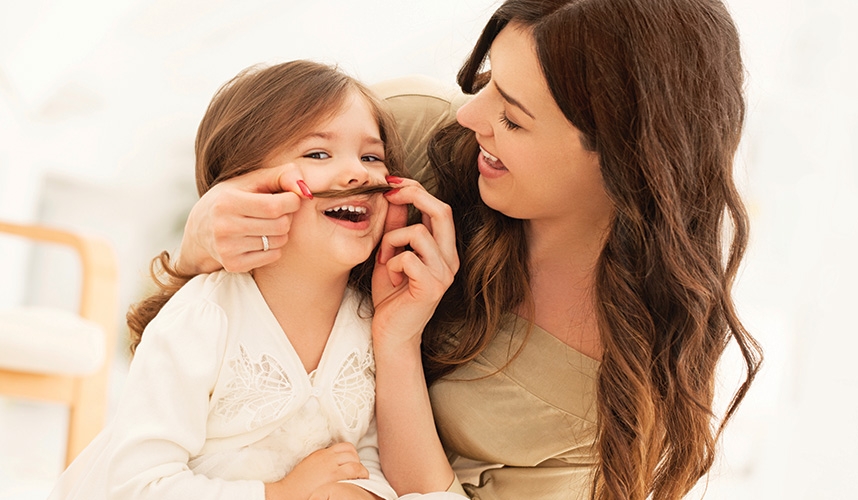The day had been long and i was feeling exhausted. My 14 month old daughter Ruby was clingy. How on earth could I occupy her while I tidied up and cooked dinner? I put her in her high chair to eat a snack. I opened the fridge, then shut it again. For some reason this made her giggle. So I repeated the action, this time exclaiming a big ‘’oh’’ as I opened the door as if surprised by the contents. Then I shut it quickly and ran back across the kitchen with mock fright. Her giggles increased. Next I pretended I couldn’t open the fridge door, and pulled and pulled with all my might until it sprung open. I flew back across the kitchen in surprise. My daughter laughed and laughed! I repeated this over and over, laughing along with her. We both felt much more relaxed as we laughed together, and the best thing was that after eating her snack, my daughter played independently while I cooked.
This is what Hand in Hand Parenting calls Playlistening. We pick up on something that makes our child laugh, and repeat it to get the giggles flowing. Playlistening is any kind of laughter play where the child takes the more powerful role (so no tickling is allowed!). In this case Ruby was laughing at my surprise and fright while she sat safely in her high chair.
BUILDING CONFIDENCE
Babies come into this world helpless and dependent on us for everything. Playlistening reverses the roles for a while, so that children feel strong and build their confidence. In her articles and booklets, Patty Wipfler, the founder of Hand in Hand, explains that laughter has a healing function, it’s one of the natural ways in which our bodies recover from stress and upsets. Playlistening can be used in a ‘surgical’ way to help children release the tension caused by fears. So for instance if your child is frustrated with her attempts at learning to walk, then you could walk really unsteadily and then fall over. If she laughs she may feel bolder in taking this developmental leap.
Children laugh up to 400 hundred times a day, whereas adults laugh only 15 times. Sometimes it takes a grown up reason to start us laughing again. Dr Madan Kataria is a medical doctor in India who reviewed the literature on the scientific health benefits of laughter. Studies have shown that laughter lowers stress hormones such as cortisol and adrenalin, and releases feel good endorphins. It also lowers blood pressure, and boosts the immune system, so it can act as a preventative measure against stress related illness such as heart disease and cancer.
“Children laugh up to 400 hundred times a day, whereas adults laugh only 15 times. Sometimes it takes a grown up reason to start us laughing again”
HEALTH BENEFITS
Dr Kataria decided to experiment to get people laughing. He went to his local park one morning, and tried to invite people to laugh with him. Many people refused thinking he was crazy, but a few brave souls joined him and the first laughter yoga club was born. From his scientific literature, Dr. Kataria learnt that “fake” laughter has just the same health benefits as genuine laughter. He devised exercises to get people laughing, until they could maintain a state of free flowing giggles he called laughter meditation. At this point the division between “fake” and “real” laughter dissolves.
This was the incentive I needed to start laughing along with my daughter. Even if I don’t feel like it at first it’s never long before my laughter feels genuine.
LISTENING TOOLS
Playlistening is one of six listening tools that Hand in Hand teaches parents to help them connect with their children. These listening tools are based on the idea that children are naturally kind, loving and co-operative. Off-track behaviour is a sign that they are feeling disconnected, and need our attention. In our busy lives, it’s near impossible to give children the infinite attention they seem to need!
There are so many times in my life as a parent where I feel exhausted, like I can’t take any more, and need some time to myself. At these times my daughter is usually much more whiney and clingy, as if she can pick up on my inner thoughts! What I’ve found is that in these moments if I can find a way to connect with my daughter we both feel a lot better. Sometimes it’s hard to muster the energy, but if we can find something funny and take a five minute laughter break, then we both feel rejuvenated.
Laughter can also be used to dissolve many of our daily parenting struggles. For instance, if my daughter’s constantly throwing off her hat, I can turn it into a giggly game where I beg her not to. She then gleefully ignores my pleas and laughs. I start to feel more relaxed about enforcing the ‘you must wear a hat rule,’ and simply enjoy the fact that she’s having fun.
FINDING PATIENCE
Laughter can be used when we really do need to set a limit. For instance, if our child reaches out to get an extra cookie, we can say ‘no, no, no’, and hold back their arm, turning it into a friendly wrestling game. Our anger at having a “disobedient” child can dissipate. When we laugh, we relax and have renewed patience for parenting.
When we laugh we are attuned to each other, sharing joy, and fun. It’s at these moments that I remember how much I love my daughter, when I have forgotten about my to do list, and am simply enjoying being with her.
Now when Ruby’s screaming or whining, or worse, biting me for attention, I remember that this is her alarm call; that she needs connection with me. And I need it just as much too. After these laughter sessions she is often happy to play independently. If I can invest this time then afterwards I can get things done.
Children can help you learn to laugh again, if you take the opportunity. Thanks to a ten minute daily practice of laughter yoga, and playlistening with my daughter, I am laughing much more freely now. I can feel what Dr. Kataria calls the spirit of laughter entering our lives; a magical feeling, where a sense of joy underlies our day, and laughter is never very far away.
LEARN LISTENING TOOLS
Children seem to want all of our attention, but we do not always have the time and energy to give it to them. When children’s behaviour go off track, it’s usually a sign that they are feeling disconnected. Hand in Hand teaches ‘listening tools,’ that help us to maintain our connection with our children.
Staylistening When our children cry we offer our closeness and love, even if we can’t fix the problem. If all their needs are met, then we don’t try and stop the crying, but just listen.
Special time, is time spent following our child’s lead, listening to what they want to do, rather than directing play, making lots of eye contact, and generally being loving and affectionate.
Setting Limits, is done with warmth, and love. We can set limits playfully, for instance hugging our child when they try to bite us, or in a more serious but still loving tone. If a child cries about the limit, then we staylisten with them.
Playlistening, is when we try to engage our child in play where they take on a more powerful role, makes them laugh (anything other than tickling). So for instance, my daughter giggles a lot when I try to chase her but can’t catch her. These sort of games help build a child’s confidence as they feel powerful and strong.
FOUNDATIONS OF CONNECTION PARENTING
- When children feel connected, they learn readily, love easily, and become caring leaders among their peers. A healthy parent-child connection enables a child to fully access his intelligence and ability.
- When parents feel connected with their children and with other parents, they have greater success at solving problems at the heart of family and community life. Parenting becomes more fun, and more rewarding.
- When children’s behavior goes “off track,” they are asking for closeness, connection and understanding. Parents can use the tools of Special Time, Playlistening, Setting Limits or Staylistening to rebuild the connection with their children. The child offloads stress, reconnects, and can then make thoughtful decisions and learn from his experience.
- When emotional stress sends parents’ behavior “off track,” they need the support of a listener who appreciates how much they care and how hard they try. Parents need the safety to offload feelings that interfere with their ability to guide their children with love and sensible limits, kindly held.
MORE INSPIRATION
READ Parenting by Connection by Patty Wiffler, available from handinhandparenting.org.
SEE youtube.com/user/handinhandparenting for how to encourage connection between adults and children
VISIT kateorson.com/parenting for more information on Hand in Hand Parenting and how parenting can be more fun and rewarding.







